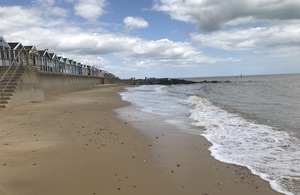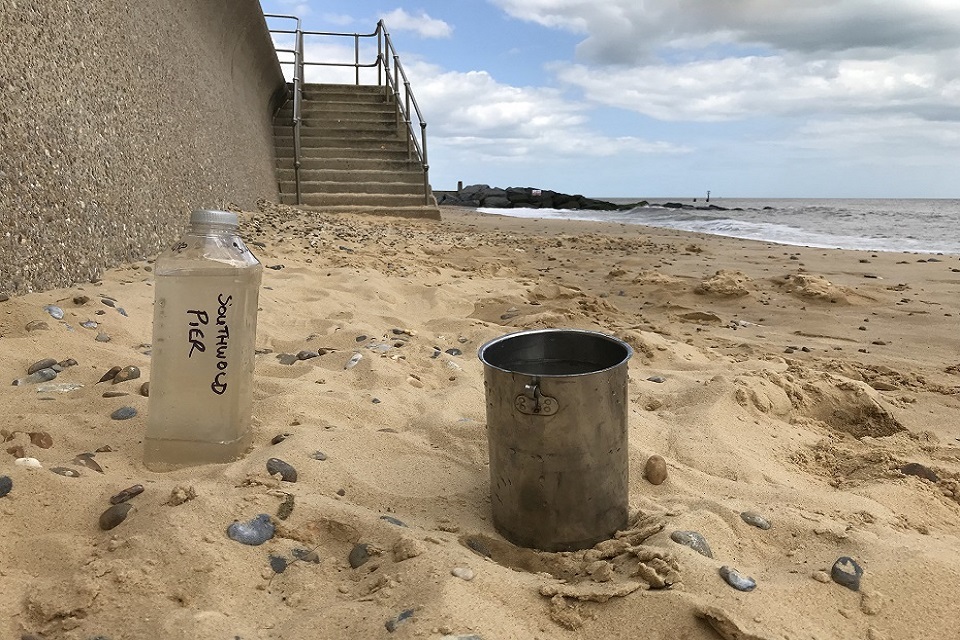Southwold bathing waters classified as excellent and good
99% of bathing waters in England have passed water quality standards following testing at over 400 designated sites carried out by the Environment Agency.

Southwold beach.
The results show that for the 2021 bathing season 94.7% of beaches and inland waters gained an excellent or good rating. While 4.3% achieved the minimum sufficient rating. This compares with 98.3% passing the required standards in 2019, and is the highest number since new standards were introduced in 2015.
Among the bathing waters achieving excellent and good are the 2 designated bathing sites at Southwold.
Southwold the Pier bathing water has been classified as excellent meaning the local authority can re-apply for a blue flag provided it meets other criteria. Southwold the Denes also went up in classification to good.
Southwold the Pier dropped from excellent to good in 2018 and has remained there until now. This was due to the occasional high result for E.Coli.
Investigations carried out by the Environment Agency were inconclusive but contamination by algae was a possible cause of the E. coli recorded. In 2021 no high levels of E. coli were present in any of the samples and therefore the bathing water quality was classified as excellent.

Beach sampling equipment at Southwold beach.
At Southwold the Denes, the Environment Agency and Anglian Water have worked together to improve the water quality. The bathing water has been classified as sufficient since 2017 but has now improved to good.
Investigations by the Environment Agency and Anglian Water in 2018 revealed that the Southwold Waste Water Treatment Works was causing bacterial contamination of the Denes bathing water. As a result, Anglian Water started chemical dosing in 2019 to disinfect the wastewater to reduce the bacteria levels in the bathing water during the bathing season. This technology has helped improve the water quality.
A permanent system to disinfect the sewage effluent will be completed by March 2025. An enlarged storm storage tank was installed at the Waste Water Treatment Works in 2021 to reduce the frequency and volumes of storm sewage discharges.
John Daniels, Senior Environment Officer, said:
We are thrilled that the bathing waters in Southwold are back to Excellent and Good. It is great to be able to work with Anglian Water and achieve these results.
Greg Hall, Coastal Catchment Manager for Anglian Water said:
In 2019 we invested in constructing temporary disinfection technology at Southwold Water Recycling Centre prior to any request from our regulators to help improve the bathing water quality.
Particularly on Southwold Denes Beach because we know how important it is to the local community.
We’re the first water company in the UK to trial PFA chemical disinfection. This is a more cost and carbon efficient form of disinfection compared to the traditional method of UV disinfection and completely safe for the environment.
The trial has been completely successful. We’ve been delighted to see that virtually no bacteria was recorded at Southwold Denes beach during the 2021 bathing season in the Environment Agency bathing water samples.
The Environment Agency has been monitoring bathing water sites since the 1990s, and in this time there have been significant improvements. In the early 1990s, for example, just 28% of bathing waters met the highest standards in force at that time. Based on today’s data, 99% of bathing waters meet the minimum standard, with 70.7% reaching the highest standards.
While progress has been made, there is still much more to be done to ensure cleaner and healthier waters for people to enjoy. We are clear that more needs to be done on the part of water companies. We are taking robust action to support regulators, businesses, farmers and councils to help clean up our waters.
Since 2015 the Environment Agency has required water companies to install Event Duration Monitors at bathing water sites. This captures data on the frequency and duration of storm overflow discharges. All the data is published online so the public can see what is happening in their local area. More than 12,000 of England’s 15,000 storm overflows now have these monitors, and the remaining 3,000 will have them by end of next year.
Knowing more about water quality helps people make informed decisions on when and where to swim. The Environment Agency’s Swimfo website provides detailed information on each of the 400+ bathing waters in England. It also notifies bathers when Pollution Risk Warnings have been issued.
Environment Agency chair Emma Howard Boyd said:
With billions spent on seaside visits every year, we know good water quality helps coastal towns prosper. Twenty years of improvements in bathing water took targeted regulation and significant investment. While this is reflected in today’s results we must continue to work together to maintain this trend.
We cannot afford to be complacent. Public confidence in water quality has faltered in recent years with new evidence of pollution incidents getting much needed attention as a result of some excellent campaigning. The polluter must pay. To restore trust, water companies, industry and farmers need to get the basics right or face legal action.
The prize is multiple benefits to people and nature. The Environment Agency is working to ensure £120 million is invested in coastal habitats like England’s saltmarshes. Which will protect against coastal erosion and also store carbon equivalent to nearly 40 million people’s annual domestic emissions.
Environment Minister Rebecca Pow said:
Water quality is an absolute priority. We are the first Government to direct Ofwat to prioritise action by water companies to protect the environment and deliver the improvements that we all want to see.
But we must go further to protect and enhance water quality. Our Environment Act puts in place more protections against water pollution than ever before. We are investing in programmes to support farmers to tackle water quality issues and we are clear that where water companies do not step up we will take robust action.